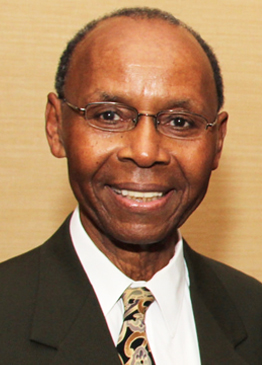James H. Coleman

The Honorable James H. Coleman, former New Jersey Supreme Court Justice, was born in 1933 in segregated Lawrenceville, Virginia, the son of a sharecropper. He described his childhood in a 2014 interview with Legal Services of New Jersey as follows:
I was born in the south, in Southside Virginia when Plessey v. Ferguson was the law of the land that controlled every aspect of life in the African American world, from birth until death. My paternal grandmother, who somehow, having been born in 1840, became a midwife and she delivered me in a farmhouse, somewhat similar to that in which Abraham, President Abraham Lincoln, was born.
Coleman overcame great odds to earn his Bachelor of Arts degree from Virginia State College and his Juris Doctor from Howard School of Law in 1959. In 1978, he was appointed to the New Jersey Superior Court, Law Division; in 1981, the Appellate Division. As an Appellate Division judge in 1985, he wrote the crucial decision in State v. Gilmore that declared unconstitutional the then-practice by prosecutors of eliminating potential jurors because of their race. He was also instrumental in establishing the Supreme Court Committee on Minority Concerns.
He was nominated to the New Jersey Supreme Court by Governor Christine Whitman and, in 1994, was sworn in as the first African American New Jersey Supreme Court Justice. Justice Coleman authored the majority opinion in Community Realty Management Inc. v. Harris (1998), a case argued by Camden Regional Legal Services with amicus curiae by Legal Services of New Jersey that is considered a landmark case on behalf of tenants in New Jersey, increasing protections for pro se defendants. The decision required trial courts to provide advice and information to tenants appearing pro se in eviction cases about their legal rights, and also to ensure that the grounds for eviction asserted by landlords are legally correct.
Again, in a 2014 interview with Legal Services, he shared the following thoughts about the legal rights of indigent people:
I have been providing legal services in one form or another to our indigent population continuously since 1957 when I was in law school. Economic and racial injustice largely contribute to circumstances that have caused more than 25% of New Jerseys population to be living below the poverty line. They must rely therefore on Legal Services for civil representation. During my years as a lawyer and as a jurist, I tried to create more civil and racial justice by ensuring that courthouse doors are just as open for the poor as for the rich. That was important to me because a judiciary that does not support that mission has forgotten its own mission.
Justice Coleman retired from the Court in 2003 and joined Porzio, Bromberg & Newman, where he is Of Counsel. He has authored over 2,000 opinions, with approximately 400 published, and has been a lecturer at Rutgers University School of Law, Seton Hall University School of Law, the National Bar Association, Black Congress on Health and Law, Foster Parents Association, the New Jersey Judicial College, and the American Academy of Judicial Education. He served as Chairman of the Board of Legal Services of New Jersey from 2003 to 2007 and continues to support the mission of Legal Services and equal justice.
"I have reason to like what I've tried to do in life and to be pleased with whatever small level of success I've achieved. The great hope is that that will serve as inspiration to others."
AWARDS & RECOGNITIONS
2011–2017 Recognized in Best Lawyers in America, Appellate Practice, Arbitration and Mediation
2016 New Jersey Law Journal Lifetime Achievement Award
2015 NJ Hall of Fame Nominee
2013 Justice Thurgood Marshall Award of Excellence
2003 New Jersey State Bar Association Medal of Honor